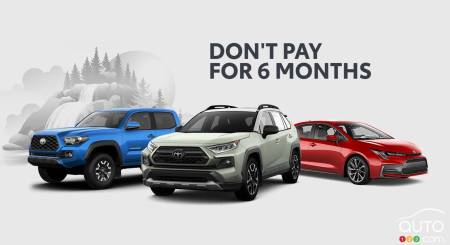How hard has the auto industry been hit by the coronavirus pandemic? Car sales fell off a cliff worldwide in March, and April promises to far worse by the time it winds down.
One result is that vehicles stocks are piling up everywhere, just as production is slowly resuming around the world. For the first weeks production will generally run at well below full capacity, but it’s expected manufacturers will quickly get their factories back running at full speed.
It’s not hard to deduce from that that the industry will end up with a logjam of stocks. For automobile production to continue at pace, manufacturers will have to find a way to liquidate existing inventories. This likely won’t be possible via straight incentives offers alone; more will be needed to kick-start sales.
If there’s a clue to what the automakers will resort to, it might be found in the last major crisis that hit the auto industry: the economic collapse of 2008.
Auto123 launches Shopicar! All new makes and models and all current promotions.

CARS
Launched in July 2009 in the United States, the CARS (Car Allowance Rebate System) program was designed to offer a cash payment to owners of aging vehicles when they committed to buying or leasing a new vehicle. It was commonly referred to as the "Cash for Clunkers" incentive. In total, the US federal government invested $3 billion to encourage consumers to replace their inefficient old car with a newer one.
A big part of the pitch to potential buyers was of course that question of fuel efficiency. Depending on the gains in fuel savings realized with the purchase of a new, more-efficient vehicle, amounts offered as part of the incentives program could range from $3,500 to $4,500. For owners of an old vehicle worth $1,000, this kind of offer was pretty hard to resist.
With the current crisis, we can easily see the need for a program of this magnitude to boost the sale of new vehicles.

Pressures
Within the Canadian automotive industry, a chorus of voices is calling a series of government measures that will help boost sales - including an incentive similar to the Cash for Clunkers program of 11 years ago. Some are even pushing for a three-month tax holiday on the purchase of a new vehicle.
A letter signed by the Canadian Automobile Dealers Association, the Canadian Vehicle Manufacturers' Association and the Global Automakers of Canada stated the following:
“A GST/HST holiday on all new vehicle sales would be an effective way to quickly encourage consumer vehicle purchases and reboot Canada’s vehicle sales industry, which has suffered an unprecedented decline of 42 per cent in March and is on track to decline by 75 per cent in April.”
- Joint statement by Canadian auto industry stakeholders
The letter also states that a national program that would provide $3,000 per scrapped vehicle “can stimulate consumer purchasing while also achieving incremental reductions of greenhouse gas.”

It’s still too early in the game to know how things will unfold, but it virtually certain there will be some action – or actions - taken to stimulate vehicle sales in both the United States and Canada.
In North America, the automotive sector accounts, either directly or indirectly, for one out of every seven jobs. A strong bounce-back by the industry is not only desirable; it’s essential to an overall economic recovery.






